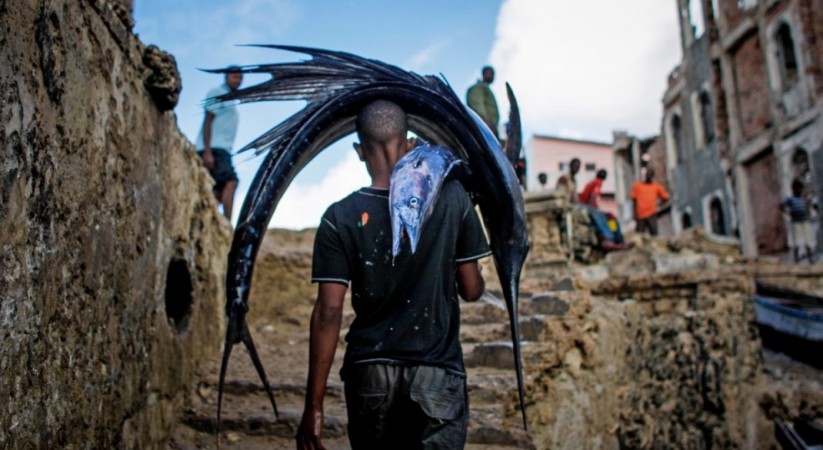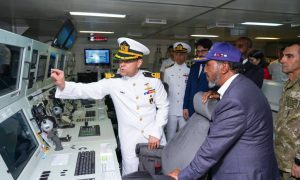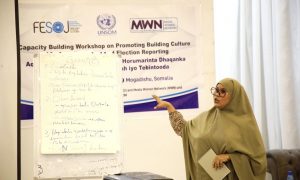
Thanks to “Black Hawk Down” and “Captain Phillips,” Hollywood has permanently etched into the brains of my students (and probably a lot of Monkey Cage readers) that Somalia is a lawless place of warlords and pirates. Even as piracy has declined in the past few years, the narrative of Somali pirates has staying power.
Over time, some of my students have adopted a more sophisticated perspective on pirates off Somalia’s coast, pointing out the origins of Somali piracy: “in conflicts between artisanal Somali fishers and foreign fleets.”
That quote comes from the report “Securing Somali Fisheries,” published by an interdisciplinary group of researchers last month. The report aims to close the information gap on Somali fisheries, using innovative (as well as tested) methods of data collection to estimate fishing in Somali waters and the potential opportunities that Somali fisheries offer, given the right mix of regulatory, political and economic environments.
The report found that the primary challenge to making Somalia’s fisheries sustainable was foreign illegal, unreported and unregulated (IUU) fishing. “Securing Somali Fisheries” estimates that foreign IUU fishing vessels catch three times as many fish as the Somali artisanal fishing sector.
IUU fishing is not only a threat to Somali fisheries because of piracy (even if that’s what some journalists would have us believe). IUU fishing threatens income and food security. In Securing Somali Fisheries, one artisanal fisher from Puntland remarked about Yemeni vessels fishing close to the Somali shore: “They are not just robbing our fish. They are ramming our boats and taking our nets.”
As a political scientist, what I found most interesting in the report were mentions of Somaliland, the self-declared independent state that is not internationally recognized as independent but as an autonomous region of Somalia. In a description of Somalia’s run-down ports infrastructure, Securing “Securing Somali Fisheries” describes Somaliland’s port of Berbera as one of the largest and most advanced and said that it had been vastly improved over the past decade — all of which would have been under the aegis of the Somaliland government, which formally declared its independence from Somalia in 1991. (Its constitution was ratified in 2001 via a popular referendum.)

The report had other examples of active fishery governance in Somaliland. In one section lamenting how much of the fishing in Somali waters is unreported, there is an example from Berbera of fishers collaborating with a nongovernmental organization reporting their catch. “Securing Somali Fisheries” also pointed toreports of Somaliland seizing multiple Yemeni and Egyptian vessels fishing illegally in its waters in 2014.
These examples of Somaliland governance reminded me of Stanford political economist Nick Eubank’s paper on political accountability in Somaliland (see ungated summary of that paper here). Alongside a rich description of Somaliland’s political history since its 1991 declaration of independence, Eubank’s paper chronicles political conflicts over Berbera. The Somaliland government tried at first to take the port by force to impose taxation and shore up its revenue base, but the local power brokers resisted, negotiating better representation in Somaliland’s national government by conceding power over the port.
Journalists characterize Somaliland as “remarkably safe,” often as a stark contrast to the insecurity in Somalia. Because Somaliland is not recognized as an independent state, there aren’t measures of the quality of governance in Somaliland against which we could compare other developing countries. However, Eubank’s paper argues that Somaliland’s struggle to raise revenue absent international aid has required the government to be accountable to its citizens. The few anecdotes from “Securing Somali Fisheries” suggest that Somaliland’s government has continued to be active in protecting resources essential to its financial security.
The past few years, I’ve been ending my African Politics course with students reading Eubank’s paper. When the semester ends, no one is thinking about pirates when they think about Somalia. They’re wondering instead about Somaliland’s autonomy and whether the international community should recognize Somaliland as a state.

___________________________
_____________________________________________________________________________________
Xafiiska Wararka Qaranimo Online | Mogadishu, Somalia
_____________________________________________________________________________________Advertisement
_____________________________________________________________________________________







